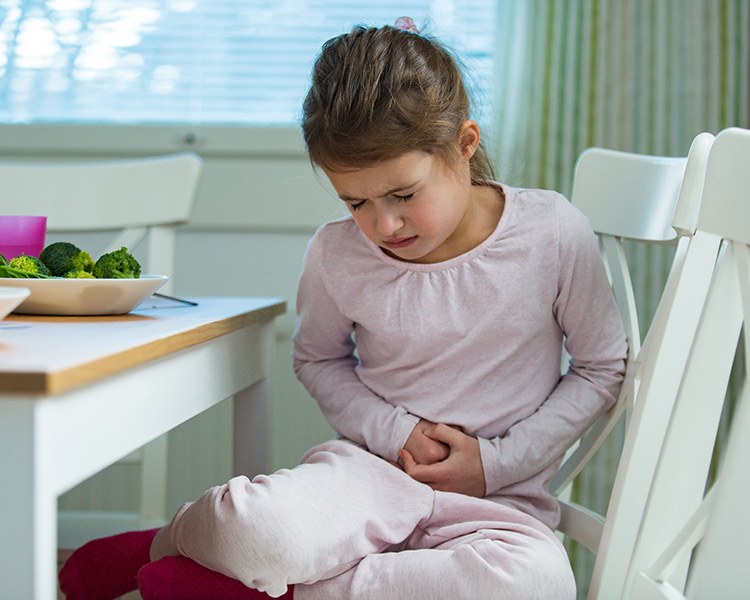Posted: April 17, 2025
Mealtime is a time of learning, connecting, and fueling little bodies. Unfortunately, for some children with food allergies, mealtime can come with underlying risks.

A child sitting on a kitchen chair with a distressed face, showing signs of an upset stomach or lower abdominal pain after eating.
On a typical day, a group of preschoolers is eating lunch and one of the children turns to you to say, “My tongue feels hot and pokey” and “my ears are itchy, and it feels like there are bugs in them.” These are statements that can strike fear into even the most experienced caregiver. These are common things that a child may say when they are having a food allergy reaction. Food allergy reactions can range in severity from mild to life-threatening. For caregivers managing a child or multiple children with food allergies, this can make snack and mealtimes stressful. Knowing what to do in this situation is critical for the safety—and possibly even the life—of the child.
Although most food allergy reactions occur in children who have a known food allergy (and have accidentally eaten a food containing the allergen), it is possible for a child to experience a reaction for the first time while in the child care setting. Since food allergy reactions can be sudden and unexpected, it is important for early care and education providers to be aware of what to look for as well as how to care for a child who may be experiencing a reaction.
Planning and Preparation are Key
If a child comes into your child care setting with a diagnosed food allergy, the plan for their care must be clear, concise, and communicated with all staff who work with the child. Advanced preparation and training for managing food allergies in the child care setting will ease the caregiver’s anxiety about what to do should a child experience a food allergy reaction.
To help prepare caregivers and arm them with the information they need, Better Kid Care has a new On Demand course, “Food Allergy Plans and Preparation,” that provides invaluable information for preventing a food allergy reaction and preparing for a food allergy emergency. This BKC course provides information on the main food allergens and how to recognize food allergy reaction symptoms, and provides the tools needed to create a food allergy and anaphylaxis emergency care plan (FAACP). The course also covers ways you can help support the family of a child with food allergies.
Keep your eyes peeled for our new course, "Food Allergy Plans and Preparation," coming soon! Learn about how to build your confidence and be prepared to prevent food allergy reactions and successfully handle food allergy emergencies.

